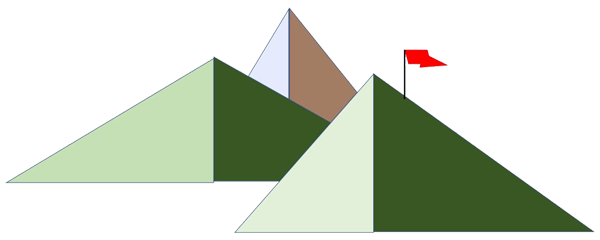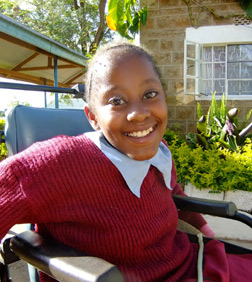- Submitted by Karen Rispin

Isaiah 30:17b "So few of you will be left that you will be like a flagpole on top of a mountain. You will be like only one banner on a hill."
- Submitted by Karen Rispin
Thanks for praying about my Zoom meetings with Jeff and Bart from Clinton Health Initiative. Kerri at CLASP was kind enough to share my name. As I understand it, they've been tasked with facilitating the effective use of funds for wheelchair provision in low-resource areas. I enjoyed interacting and they seemed to really listen when I described the advantages of working with faith-based initiatives like BethanyKids and mission hospitals. It was great to be able to open doors for meetings directly with BethanyKids leaders.
- Submitted by Karen Rispin
Good news! Our focus on facilitating local initiatives is working well during Covid.Thanks for praying and partnering to make this possible! There are three containers of wheelchairs arriving in Kenya. The one from CLASP is now in port! The one coming through Samaritans Purse, and the one from Hoggi are in transit.
This is happening just in time! Wheelchair services are reopening in Kenya with a big backlog. Moses Zeen, one of the team members with BethanyKids in Kenya, just shared some photos and asked for prayer for strength and stamina. Let's keep praying!
- Submitted by Phil Rispin
Working on-line has had some interesting benefits. For one thing it’s made us slow down and think through priorities carefully, praying through each goal. Amazing how God answers! For example, the work with the Spanish translation team for our outcomes tools has led to clarity and benefit for the English language versions of the questionnaires as well. On top of that, it has tied into one of the videos that Phil and I have been working on, and it has led to ways to improve our website. We’ve also had conversations online and by phone with many key players. I’m now wondering if this quieter pace may actually be a bit like the Aesop’s tortoise and hare story. Going in a slow steady way may be faster in the end.
- Submitted by Karen Rispin
Beauty in nature is good for us! But some of us don’t bother, and some of us couldn’t if we wanted to. Some live where the earth is covered with pavement and concrete. Some have disabilities and limited mobility. There’s even been a new term coined, “Nature Deficit Disorder”. Might want to Google it! Fascinating stuff!! It’s not just social media chatter. Here are links to a few scientific articles about the benefits of nature. There’s hard evidence!! Time in nature leads to lower levels of stress depression and anxiety, Prescribing time in nature to effectively treat ADHD, Nature time improves the health of children and helps them do better in school. This isn’t only physical and mental wellness. Many people, even secular academics, feel strongly that there are ties to spiritual wellness.
- Submitted by Phil Rispin
For eight years of my life, I was a pharmaceutical sales rep. I was very fortunate in that the drugs made by the company I worked for were effective at treating certain illnesses. I didn’t find it hard to tell physicians the benefits of prescribing these drugs. However, one thing I learned was that people were often slow to change habits or behaviors. My job as a sales rep was to spot all the objections to the company products and address them. Essentially, I had to try to bring the physicians to a mind-space where they were ready to change what they were doing.
- Submitted by Phil Rispin
People often use New Year’s Eve and the following days as a chance to re-evaluate and perhaps make some changes in their lives. There are jokes based upon resolutions that last a few days and then are forgotten. Nevertheless, I think the desire to see how things went and determine what changes may be necessary is a good thing. I’ve been thinking about that with the Assistive Technology Catalyst Project. This coming June, we will have been working at this for two years, and it’s time to look back and then think about the future.
- Submitted by Phil Rispin
Many years ago, there was a drought in northern Kenya. A well-meaning man sent a container load of powdered Hollandaise sauce to a mission headquarters in Nairobi where it was delivered and put in the parking lot. This was to be distributed to the needy folks in the northern part of the country. I am sure that this man’s reasoning was something like “instant calories, just add water”. He didn’t know a key piece of information and hadn’t thought to ask and really listen. Powdered Hollandaise sauce was a completely unknown food to the hungry people, and it was useless. The heavy container began to sink into the pavement taking up valuable space.
- Submitted by Phil Rispin
August 8th, 2019
I love fly-fishing! In fact, I just got back from leading an outreach fly-fishing camp. So I’ve been thinking about lying to trout. Trout eat bugs, and those who tie flies for fly-fishing imitate bugs to fool trout. If a fisherman knows what the fish are eating, he can do a pretty good job of imitating what the trout wants using thread and some feathers. It’s a lie tied to a hook. I think that holds a lesson. The most dangerous lies are those, like our artificial fly, that seems to be truth.
- Submitted by Karen Rispin
Years ago, while attending a conference, a speaker issued a challenge that impacted me: “Given who you are right now, how can you best make a difference in the world for good?”
I could have answered this question differently at various stages in my life. Sometimes, at first, it seemed that I was doing nothing useful at all. But I began to see that little things could make a big difference, such as positive changes to my attitude, being present for my family, or encouraging one person at a time. God later opened doors for me to teach at a university, and now he is opening doors for my husband Phil and me to be catalysts in a process that will bring hope to those living with disabilities in low-income countries.

 Visit us on Facebook
Visit us on Facebook